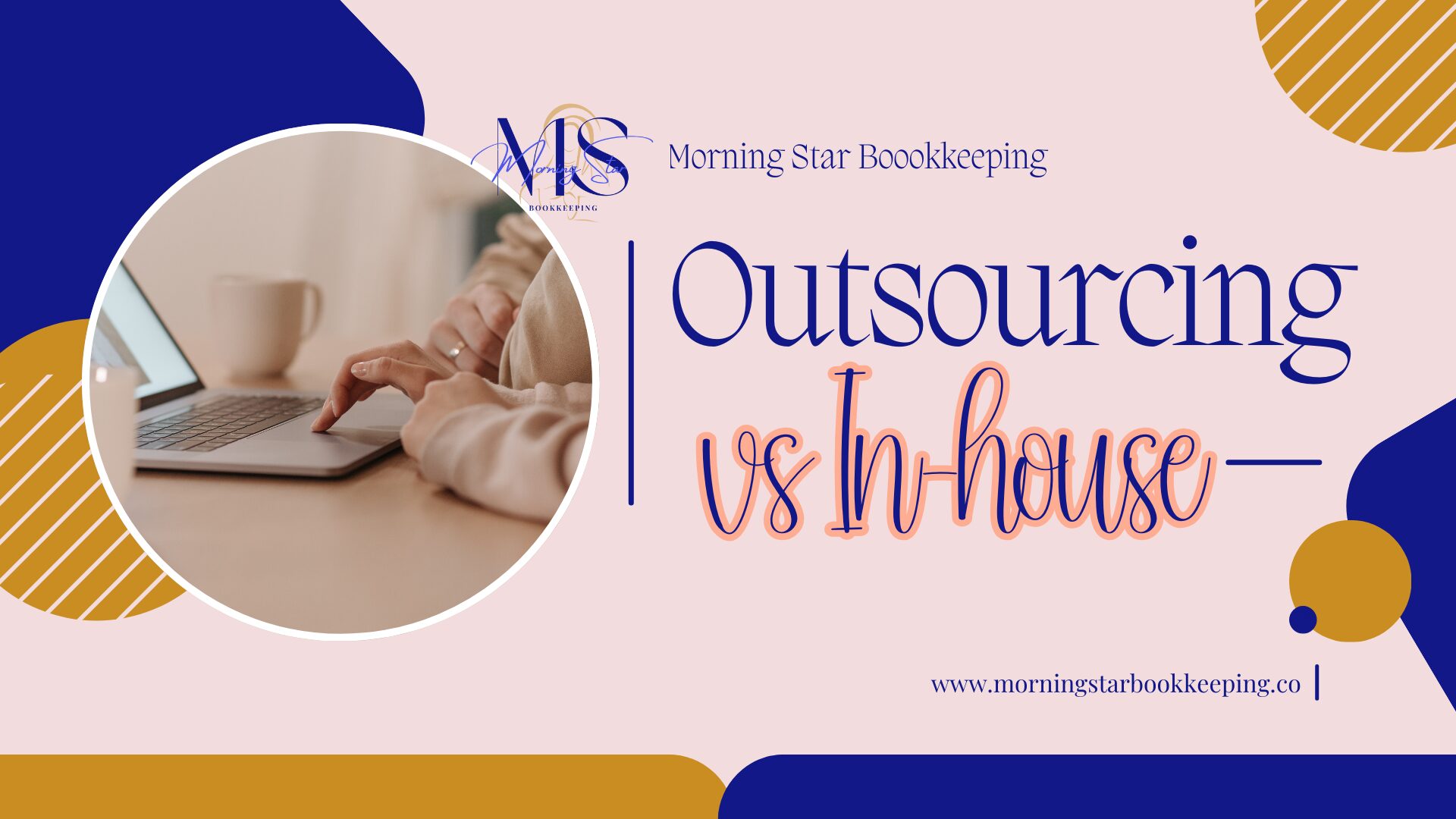Outsourcing Bookkeeping vs. Hiring In-House: Which Option Makes the Most Sense for Your Business?

Managing business finances is essential for long-term success, but many small and mid-sized business owners struggle with whether to outsource their bookkeeping or hire a full-time, in-house bookkeeper. Each option has its pros and cons, but outsourcing often proves to be the more practical and cost-effective choice, especially for small businesses.
What Does a Bookkeeper Actually Do?
Before diving into the debate, it’s essential to understand what bookkeepers do. A bookkeeper records all financial transactions, handles bank reconciliations, tracks expenses, and helps maintain financial records. They ensure that businesses stay compliant, tax-ready, and financially organized.
While both in-house and outsourced bookkeepers perform these tasks, the choice between the two affects how efficiently and cost-effectively these services are delivered.
Breaking Down the Costs: In-House vs. Outsourced Bookkeeping
Let’s compare the costs associated with hiring an in-house bookkeeper versus outsourcing the same services.
Costs of Hiring an In-House Bookkeeper
- Salary: $45,000–$60,000 per year (for a full-time bookkeeper in the U.S.)
- Payroll Taxes & Benefits: Add 25-30% of the salary for benefits like healthcare, 401(k) matching, PTO, etc.
- Office Space & Equipment: Desk, computer, software licenses, supplies (estimated at $2,500/year)
For an average in-house bookkeeper earning $30,000 annually (I am being really conservative here):
- Salary: $30,000
- Benefits (30%): $9,000
- Overhead (office, equipment, software): $2,500
Total annual cost: $41,500
Costs of Outsourcing Bookkeeping
Outsourced bookkeepers usually offer tiered pricing, with most small businesses paying between $500 and $2,500 per month depending on the complexity of their needs. For this comparison, let’s assume an outsourced bookkeeping service costs $1,500 per month.
Total annual cost: $1,500 x 12 = $18,000
Savings:
$67,500 (in-house) – $18,000 (outsourced) = $23,500 per year saved by outsourcing bookkeeping.
Flexibility and Scalability
Outsourced bookkeeping services offer much greater flexibility and scalability. As your business grows, your bookkeeping needs will change. With an outsourced service, you can easily upgrade or downgrade your plan without the hassle of hiring, firing, or retraining employees. Even a small agency can outsource and add bookkeepers to your account so you can grow. If your business slows greatly, you can always downgrade the plan you are on with contractors.
In contrast, an in-house bookkeeper’s workload may become overwhelming as your business expands, requiring you to hire additional staff or invest in more software and training. Conversely, if your business slows down, you are still responsible for paying your in-house bookkeeper’s salary and benefits.
Expertise and Specialization
When you outsource bookkeeping, you gain access to a team of experts with a variety of skills and industry knowledge. These professionals stay up-to-date with tax laws, compliance regulations, and best practices, ensuring that your business stays in good standing. Building on the scalability and expertise…contracted bookkeepers can bring in specialists for different parts of your bookkeeping – need an AP specialist? Your bookkeeper can bring one in to look
In-house bookkeepers may have limited expertise and could struggle to keep up with changing financial regulations. Mistakes in bookkeeping can result in penalties, missed deductions, and lost opportunities to optimize your financial operations. If you want the continued education for hired staff, the business is responsible for paying for the education and paying for the time spent on it.
Technology and Software Advantages
For an in-house bookkeeper, you’ll need to purchase software licenses and invest in training to keep up with new features. If the software becomes outdated or if your bookkeeper leaves, you risk disruptions in your bookkeeping process. You need to pay for additional access or software to have available for employees.
Outsourced bookkeepers purchase all their own software and tech tools. To add to that, bookkeepers often have discounted access to the software of your choice, meaning you pay less and they are saving you money on your software. Some even offer the software built in to their pricing.
Time Savings and Increased Productivity
When business owners try to manage their own bookkeeping or oversee an in-house bookkeeper, it can take away valuable time that could be spent growing the business. According to a study by Wasp Barcode, small business owners spend an average of 5-10 hours per week on bookkeeping tasks. That’s time that could be spent focusing on strategy, sales, and customer relationships.
By outsourcing, you free up time and mental energy, allowing you to focus on what you do best—running your business. You are able to be more productive because you are no longer calling in tech issues, calling your CPA and accountant, or trying to figure out how to pay those quarterly taxes.
How Much Can Outsourcing Really Save You? (With Real-World Math)
Let’s look at a side-by-side cost comparison to see how much you could save with outsourced bookkeeping:
| Expense | In-House Bookkeeper | Outsourced Bookkeeper |
|---|---|---|
| Salary (avg of $25/hr) | $50,000/year | $1,500/month |
| Benefits & Taxes (30%) | $15,000/year | N/A |
| Overhead (Office, Equipment) | $2,500/year | N/A |
| Software & Training | $3,000/year | QBO $2,800/year |
| Total Annual Cost | $70,500/year | $20,800/year |
| Savings | $49,700/year |
As the table shows, outsourcing bookkeeping can save your business over $50,000 per year—savings that can be reinvested in marketing, product development, or other growth opportunities.
Who Should & Should Not Consider Outsourcing?
Who should be outsourcing?
- Small and mid-sized businesses with limited budgets
- Service-based businesses with fluctuating workloads
- Entrepreneurs who prefer to focus on growth and strategy
- Businesses scaling up and needing more robust financial oversight
Hiring an in-house bookkeeper may still be the right choice for larger companies with complex financial needs that require daily attention. However, for many small businesses, outsourcing is the smarter, more efficient option.
When are you ready to hire in-house?
- Daily oversight is required for things like inventory management, payroll for hundreds of employees, or compliance with multiple tax jurisdictions.
- Having someone physically present ensures quicker responses to financial issues, real-time budget tracking, and seamless communication with other departments.
- When you have highly complex financial operations, such as large corporations or companies dealing with a lot of transactions
- When you need immediate access to financial data, this is especially important for companies with meetings that frequently need financial data
- When you have thousands of transactions and need daily reconciliations
